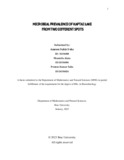Microbial prevalence of Kaptai lake from two different spots
Abstract
Kaptai Lake one of the largest artificial freshwater lakes in South-east Asia which is situated in
Rangamati district of Bangladesh. The people of Rangamati are greatly dependent on Kaptai Lake
for their food source, agriculture, etc. So, the water sample of Kaptai Lake is tested in this study
to check the microbial load of the water. The samples were collected from two different spots
include Banarupa and Fisharighat. A total of 6 samples were collected in different time interval
from those spots. The experiment was performed with a combination of spread, pour and streak
plating on different selective media includes MacConkey, SS, TCBS and EMB.
Characterization and Gram Staining were performed to identify the species. Got different types of
coliforms and fecal contaminators- Escherichia, Vibrio, Shigella, Salmonella, Klebsiella,
Enterobacter. Moreover, Antibiotic Susceptibility test was performed to check the resistance
pattern. Around 14 different antibiotics from different class were used. In the study, approximately
68 microorganisms were isolated from the water samples of Kaptai Lake, most of the
microorganisms were gram negative (92%) and rest of them are Gram Positive (8%). Most of the
organisms showed sensitivity to most of antibiotics that used. Comparing to other researches,
susceptibility rate is higher than the water samples of Dhaka city. So, we found the low resistance
rate. A small amount of organism showed resistance to those antibiotics.

